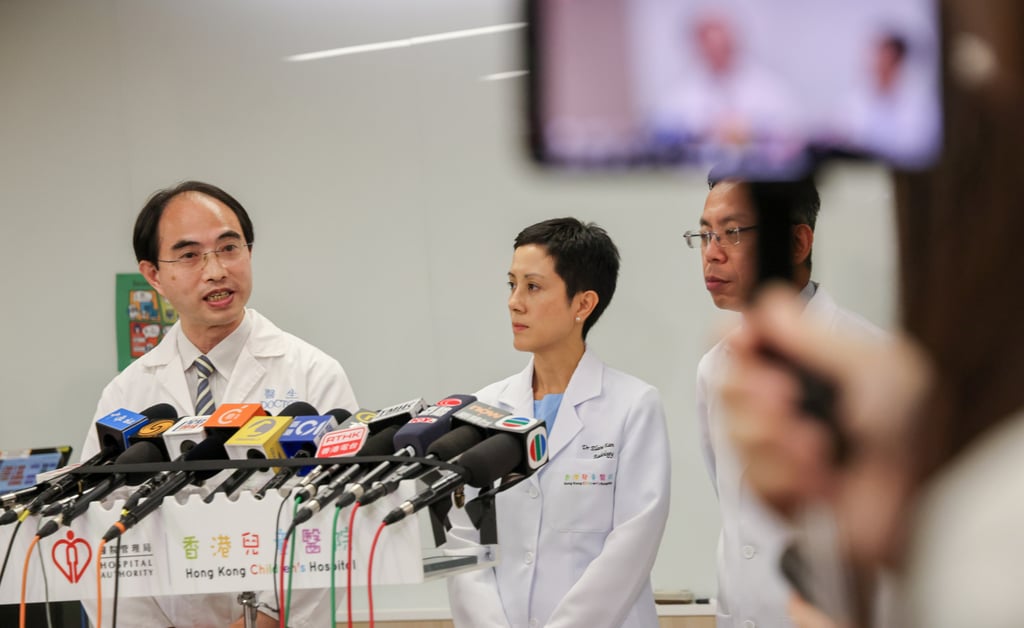Hong Kong received its second cross-border cord blood transfer from Guangdong province on Thursday to treat a five-year-old girl who suffers from a severe form of blood disorder thalassaemia.
The donated cord blood could provide a source of stem cells for transplant to the girl and potentially cure her, according to doctors from Hong Kong Children’s Hospital.
The Post takes a look at why storing cord blood has become popular in recent years among new parents and whether it is necessary.
1. What is umbilical cord blood?
After a baby is born, the blood that remains in the placenta and umbilical cord is known as cord blood.
2. Why store cord blood?
Cord blood is rich in stem cells and can be used like bone marrow to be transplanted to patients for treatment of various blood diseases, such as thalassaemia and leukaemia.
It has the blood-producing stem cells that could develop into the blood cell types that a patient needs, such as red blood cells, white blood cells or platelets.
Private cord blood banks in Hong Kong frequently promote their services to new parents at baby product exhibitions.
3. Is storing cord blood necessary?
Professor Raymond Liang Hin-suen, a specialist in haematology and haematological oncology, said the likelihood of using one’s own cord blood was slim.
Liang said there was a limit in stem cells with the small amount of cord blood collected, and people weighing 40kg (88lbs) or above would not be able to benefit from the method.
People suffering from hereditary diseases also could not use their own cord blood as it could also carry defects, he said.

Liang said people requiring a stem cells transplant could also obtain it from bone marrow or blood, other than cord blood.
Only patients suffering from certain kinds of cancer, such as a brain tumour or some types of children’s cancer like neuroblastoma and retinoblastoma, could benefit from their own cord blood.
“The likelihood of using [one’s own cord blood] is small. But we don’t know whether there will be any technological advancement decades later,” he said.
“If one has extra money and [storing cord blood] is not too much of a financial burden, there is no harm in doing it.”
4. Where can one store and obtain cord blood?
Both public and private healthcare sectors have cord blood banks. The Hong Kong Red Cross Blood Transfusion Service is the public service.
The donated cord blood would be stored anonymously and used for other patients in need, and donors cannot request to get their own cord blood units for private use.
Hong Kong also has a few private cord blood banks that offer storage services with a fee. Some of them charge from HK$25,000 (US$3,200) to HK$30,000 for a storage period between 18 and 25 years.
5. Are there regulations for storing cord blood in Hong Kong?
According to the Department of Health, there is no specific ordinance regulating the storage of cord blood in Hong Kong. But the collection and use of cord blood are regulated by existing laws under different circumstances.
Cord blood is considered as an “organ” and falls under the regulation of the Human Organ Transplant Ordinance which bans commercial transactions for transplant.

Pharmaceutical products derived from cord blood are also regulated by the city’s pharmacy and poisons ordinance.
Despite the lack of regulation on cord blood banks, there are accreditation organisations from the United States setting international standards for operating this kind of facility.
They included the Foundation for the Accreditation of Cellular Therapy and Association for the Advancement of Blood and Biotherapies.
6. How common are cord blood transfers from outside Hong Kong?
Dr Frankie Cheng Wai-tsoi, of the paediatric haematology and oncology team at the Children’s Hospital, said most stem cells used for transplant were sourced locally.
He said Hong Kong had seen cases of sick children getting their cord blood stored overseas to be sent to the city for treatment purposes.
The city in 2011 and 2012 also received cord blood from people in mainland China not biologically linked to patients in Hong Kong, and a donation between siblings in 2018.


